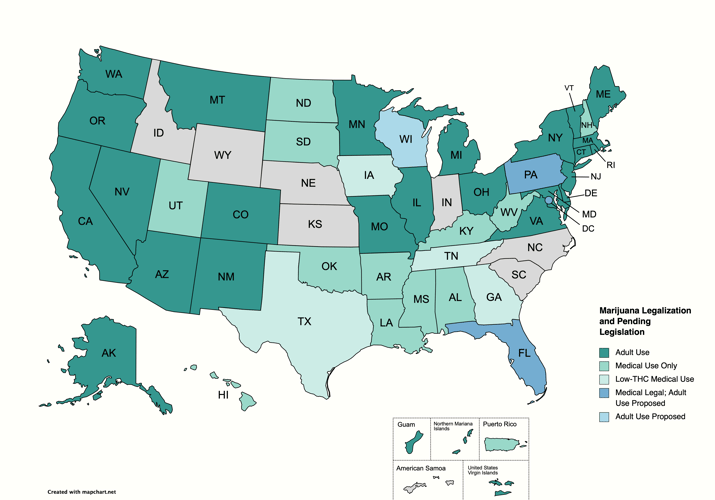Despite strong Republican political opposition, Ohio voters approved a regulated cannabis use and sales program Tuesday, making it the 24th state to legalize adult use.
Issue 2 handily passed 57% to 43%. Polls indicated that the measure would pass by such a margin, even as Republicans adopted a resolution opposing it and opponents were accused of releasing misleading ads. Supporters reportedly included U.S. Rep. Dave Joyce, co-chair of the Congressional Cannabis Caucus, and U.S. Senate Banking Committee Chairman Sherrod Brown.

Map created using mapchart.net.
The new law allows adults 21 and older to consume and possess up to 2.5 ounces of cannabis and cultivate up to six plants, 12 per household, for personal use. It would permit controlled and regulated commercial cultivation and sales by licensed businesses overseen by a new Division of Cannabis Control (DCC) under the Department of Commerce. It would also exempt financial institutions that provide services to licensed cannabis businesses from criminal liability.
Ohio legalized medical marijuana in 2016 and currently has 222 active business licenses, according to the CRB Monitor database. Those businesses will be able to convert to adult-use licenses, which must be awarded within nine months of the act’s effective date. Additionally, the DCC is to issue 50 adult-use dispensary licenses and 40 Level III adult-use cultivator licenses. Application forms are to be available within six months.
Current cultivators will be allowed to expand their grow canopy and receive adult-use dispensary licenses. Level I cultivators, which can now grow up to 100,000 square feet, will also be allowed to receive three dispensary licenses. Level II growers, which can expand to 15,000 square feet, shall be issued one dispensary license. Level III cultivators may have grow areas of up to 5,000 square feet.
Adult-use sales would be taxed at 10%. The program is estimated to bring between $276 million to $403 million in tax revenues in the first five years, according to a Ohio State Legal Studies research paper.
The law takes effect 30 days after the election.
“Fight is not over”
It has been a long, hard fight to pass the legalization initiative, sponsored by the Coalition to Regulate Marijuana Like Alcohol. The coalition’s crusade began in 2022, but procedural errors prevented the initiative from getting on the ballot. A court settlement with state officials allowed the coalition to press forward with a petition drive if the legislature didn’t act on the initiative within four months this legislative session, which it didn’t.
After submitting more than 223,000 signatures in July, the coalition came up short and needed 679 more valid signatures. On Aug. 3, the coalition submitted another 6,459 signatures, of which 4,405 were valid, and the initiative qualified for the ballot.
Cannabis attorney Tom Haren has been the spokesperson for the Coalition to Regulate Marijuana Like Alcohol. In a LinkedIn post following the election, he said, “The election results last night were a clear mandate to establish a regulated adult use program here in the Buckeye State. I could not be prouder of our entire campaign team, nor could I be more grateful to the millions of Ohioans who came out to push Issue 2 across the finish line with a landslide 14-point victory. Onward!”
Haren did not respond to messages requesting comment.
But the initiative maintained strong opposition from business groups and Republican lawmakers who passed a resolution last month urging Ohioans to vote no.
Ohio Senate President Matt Huffman, R-Lima, has said he will bring the law back to the legislature for “repealing things or changing things that are in it."
He told The Columbus Dispatch that the general assembly may consider amending language regarding THC limits, tax rates and “other parts of the statute.”
Huffman’s office did not return phone calls requesting comment.
In a statement, state House Speaker Jason Stephens, R-Kitts-Hill, focused on changing tax allocations. Currently, the law requires cannabis taxes to be distributed to a cannabis social equity and jobs fund; a host community cannabis fund; and a substance abuse and addiction fund.
“With the passage of Issue 2, now is the time for the legislature to lead on how best to allocate tax revenues while responsibly regulating the industry,” Stephens said. “Investing in county jail construction and funding law enforcement training across Ohio should be our top priority to make our communities safer.”
Opposition groups have also vowed to lobby the state legislature for changes.
“This fight is not over. Given Issue 2 was statutory – not constitutional – lawmakers have authority to make changes to the law. They should eliminate the provisions allowing for commercial sales, advertising, and production, at a minimum,” said Smart Approaches to Marijuana in a statement.
“It’s a disappointing development but nothing’s over, the venue just shifts from the campaign trail to the Statehouse,” Protect Ohio Workers and Families said on X. “It’s a guarantee that wholesale changes await — if not an outright repeal.”
-- Maria Brosnan Liebel, CRB Monitor News